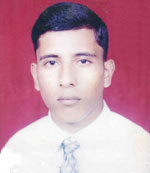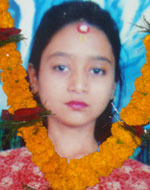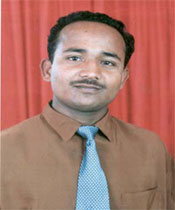Related Links
Case Updates
Krishna Adhikari
 On 6 June 2004, Krishna Prasad Adhikari, a resident of Fujel village of Gorkha District, was murdered in Chitwan District by Maoist cadres. Krishna Prasad was visiting his grandparents after having taken the SLC examinations, and he was abducted from Bakullahar Chowk by men who came on a motorcycle ...
On 6 June 2004, Krishna Prasad Adhikari, a resident of Fujel village of Gorkha District, was murdered in Chitwan District by Maoist cadres. Krishna Prasad was visiting his grandparents after having taken the SLC examinations, and he was abducted from Bakullahar Chowk by men who came on a motorcycle ... Maina Sunuwar
 Around 6 am on February 17, 2004, a group of RNA soldiers arrested Ms
Maina Sunuwar, a 15-year-old schoolgirl of Kharelthok VDC-6, Kavre
district. She disappeared since her arrest. Her family members, with
support from villagers and school where Maina was a student, visited
detention centers ...
Around 6 am on February 17, 2004, a group of RNA soldiers arrested Ms
Maina Sunuwar, a 15-year-old schoolgirl of Kharelthok VDC-6, Kavre
district. She disappeared since her arrest. Her family members, with
support from villagers and school where Maina was a student, visited
detention centers ... Sanjeev Kumar Karna
 Sanjeev Kumar Karna was one among the 11 persons arrested on October 8, 2003. On that fateful day, they had gone to attend a picnic program organized by the students at a place called Kariyachauri VDC-4, and from picnic, they went to Kataiya Chowri Area of Dhanusha district where they ate some food ...
Sanjeev Kumar Karna was one among the 11 persons arrested on October 8, 2003. On that fateful day, they had gone to attend a picnic program organized by the students at a place called Kariyachauri VDC-4, and from picnic, they went to Kataiya Chowri Area of Dhanusha district where they ate some food ... Arjun Bahadur Lama
Hari Prasad Bolakhe
Sarala Sapkota
Birendra Shah
Bishwanath Parajuli, Tom Nath Poudel and Dhan Bahadur Tamang
Chot Nath Ghimire and Shekhar Nath Ghimire
Bhauna Tharu
UN DEMANDS INVESTIGATION AND PROSECUTIONS IN CONFLICT-ERA KILLING OF SCHOOLGIRL
Kathmandu, 28 January 2015 – A body of UN human rights experts has again found Nepal in breach of its international obligations for failing to respond to human rights violations during the conflict – this time in relation to the arrest, ill-treatment and killing of schoolgirl by Government troops.
Subhadra Chaulagain, a 17 year old girl, was dragged from her house in Kavre District during the night in February 2004. She was insulted, threatened and beaten while being interrogated, and then shot in front of her father. Her father, Kedar Chaulagain, was also brutally beaten during the attack, and left for dead.
Following multiple failed attempts to seek justice in Nepal, Mr Chaulagain brought a case on behalf of his daughter and family to the UN Human Rights Committee in Geneva, represented by Advocacy Forum and UK-based human rights organisation REDRESS. The Committee’s views in the case have been made public this week.
Despite arguments from the Government that the case had been the subject of court martial proceedings, the Committee found that Nepal has not effectively investigated the case, denying Subhadra and her family justice.
According to the Committee’s decision, proceedings through a body such as the Truth and Reconciliation Commission and the provision of interim relief are not adequate remedies for crimes of such gravity. Instead, the Committee has urged Nepal to undertake an effective and complete investigation of the facts, the prosecution and punishment of those responsible, and the provision of full reparation to Subhadra’s family.
The decision is the latest in a string of rulings against Nepal for human rights violations committed during the conflict. In 2008 the Committee first ruled against Nepal in relation to the disappearance of Surya Prasad Sharma in Baglung district. Since then it has found Nepal in breach of international obligations concerning detention and torture of Yubraj Giri (2011) and Dev Bahadur Maharjan (2012), and the disappearances of Mukunda Sedhai (2013) and Tej Bahadur Bhandari, Gyanendra Tripathi and Jit Man Basnet (2014).
Although the Government has stated its commitment to implementing the Committee’s recommendations in each of the cases, little has been done in follow-up, with no effective investigations yet started or prosecutions having resulted. The Government was strongly criticised by the Committee in Geneva in March last year for its lack of action on the cases, with the Committee urging the Government to take concrete steps to give full effect to the Committee’s decisions without any further delay.
Kedar Chaulagain, Subhadra’s father, said on receiving the Committee’s decision: "We took my daughter’s case to the United Nations because we were denied justice in Nepal. The government has not investigated her case properly or done anything to bring those responsible to justice, and we have not been provided with reparation.Now the Committee has given its views, the government should respect the decision and follow it."
Dr. Trilochan Upreti, Director of Advocacy Forum – Nepal says, “The State has made commitments at both the national and international levels to provide justice to victims, including Subhadra’s family. When it fails to do so at the national level, bodies at the international level have jurisdiction to consider the case and find Nepal responsible for breaching its obligations. It is in the State’s own interest to implement the decision of the Committee provide justice at the domestic level as a failure to do so will only lead to further justified criticism.”
The Government is required to widely publicise the decision in the Nepali language, and to report to the Committee within 180 days of the steps it has taken to implement the views.
To read the COMMITTEE’S VIEWS see: [XXX] (English) or [XXX] (Nepali).
For more information please contact:
In Kathmandu: Dr Triolchan Upreti (English, Nepali) on +977-1-4004007.
In London: Eva Sanchis (English) on +44 20 7793 1777.
Notes for Editors:
Five years ago a peace agreement brought to an end a decade of violent conflict in Nepal between government forces and Maoist combatants which saw thousands arbitrarily detained and arrested, forcibly disappeared, extrajudicially killed, raped and tortured. Since then, not one person has been properly brought to justice for the crimes committed, and successive governments have granted amnesties to many of those responsible for abuses – both during the conflict and since. Impunity for serious human rights abuses remains the norm.
The United Nations Human Rights Committee the body of 18 independent experts that monitors implementation of the International Covenant on Civil and Political Rights by its State parties. It meets three times a year in Geneva to consider reports on state parties and cases submitted to it by individuals, known as ‘communications’.
The communication submitted to the Human Rights Committee details how on the night of 12 February 2004, around fifty to sixty uniformed members of the then Royal Nepal Army (RNA) armed with M16 rifles conducted a ‘sweep’ operation in Ward No. 3, Pokharichauri Village Development Committee, Kavre District. The soldiers entered the house of the Chaulagain family and grabbed Subhadra by the hair, slamming her head down on to the floor so hard it broke a floorboard and a beam in the ceiling below. Subhadra was taken outside with guns directed at her; she was insulted by soldiers and threatened with death while being interrogated. After about an hour the soldiers marched her along to a spot just near a banana tree. Subhadra’s father saw Subhadra standing and facing the soldiers. One of them opened fire, however the weapon failed. Another soldier handed him a rifle, and he forced it into Subhadra’s stomach. He opened fire on her and the force from the shot caused her body to slam down into the field below. The other three soldiers then pointed their guns down at her and opened fire. Four other soldiers ran towards her and began kicking and stamping on her body, causing her intestines to spill out of the gunshot wound in her body to the ground.
The soldiers then began kicking Mr Chaulagain and striking him in the face with the butts of their rifles repeatedly until they believed him to be dead. He was left on the ground unconscious and bleeding.
Later that night, uniformed army men also killed two other young people in the village.
Advocacy Forum is a leading non-profit, non-governmental organization working to promote the rule of law and uphold international human rights standards in Nepal. Since its establishment in 2001, Advocacy Forum has been at the forefront of human rights advocacy and actively confronting the deeply entrenched culture of impunity in Nepal.
REDRESS is an award-winning human rights charity based in London which works internationally to combat torture by seeking justice and reparation for torture survivors.
Advocacy Forum and REDRESS have been working together for a number of years on promoting law reform, supporting domestic casework, and bringing individual cases before international human rights bodies to combat impunity.
























Join Us